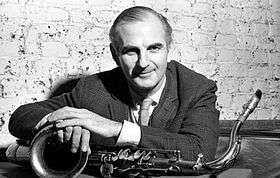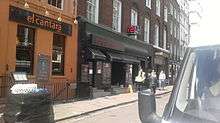Ronnie Scott
| Ronnie Scott | |
|---|---|
 | |
| Background information | |
| Birth name | Ronald Schatt |
| Born |
28 January 1927 Aldgate, England |
| Died | 23 December 1996 (aged 69) |
| Genres | Jazz |
| Instruments | Tenor saxophone |
Ronnie Scott OBE (born Ronald Schatt, 28 January 1927 – 23 December 1996) was an English jazz tenor saxophonist and jazz club owner.
Life and career
Ronnie Scott was born in Aldgate, East London, into a Jewish family.[1][2] His father Joseph Schatt was of Russian extraction and his mother Sylvia's family attended the Portuguese synagogue in Alie Street.[3][4][5] Ronnie Scott attended the Central Foundation Boys' School.[6]
Scott began playing in small jazz clubs at the age of 16, his claim to fame then being that he was taught to play by "Vera Lynn's father-in-law!". Scott toured with trumpeter Johnny Claes from 1944 to 1945, and with Ted Heath in 1946. He also worked with Ambrose, Cab Kaye and Tito Burns. Scott was involved in the short-lived musicians' co-operative Club Eleven band and club (1948–50), with Johnny Dankworth and others. He was a member of the generation of British musicians who worked on the Cunard liner Queen Mary (intermittently from 1946 to around 1950) in order to visit New York City and hear the new jazz music that was emerging directly. Scott was among the earliest British musicians to be influenced in his playing style by Charlie Parker and other bebop musicians.
In 1952, Scott joined Jack Parnell's orchestra, and from 1953 to 1956 led his own nine-piece group and quintet which featured among others Pete King, with whom he later opened his jazz club, Victor Feldman, Hank Shaw and Phil Seamen. Scott co-led The Jazz Couriers with Tubby Hayes from 1957 to 1959, and was leader of a quartet that included Stan Tracey (1960–67).
During this period Scott also did occasional session work; his best-known work here is the solo on The Beatles' "Lady Madonna". Scott also played on film scores, including the score for Fear Is the Key, composed by Roy Budd. Scott continued to be in demand for guest appearances in later years, such as providing the tenor sax solo on Phil Collins's 1981 hit single "I Missed Again".
From 1967–69, Scott was a member of The Kenny Clarke-Francy Boland Big Band, which toured Europe extensively and also featured fellow tenor players Johnny Griffin and Eddie "Lockjaw" Davis. At the same time Scott ran his own octet which included John Surman and Kenny Wheeler (1968–1969), and a trio with Mike Carr on keyboards and Bobby Gien on drums (1971–1975). Scott went on to lead various groups, most of which included John Critchinson on keyboards and Martin Drew on drums.
Scott's playing was much admired on both sides of the Atlantic. Charles Mingus said of him in 1961: "Of the white boys, Ronnie Scott gets closer to the negro blues feeling, the way Zoot Sims does."[7] Despite his central position in the British jazz scene, Scott recorded infrequently during the last few decades of his career. Scott suffered periods of depression and, while recovering slowly from surgery for tooth implants, died at the age of 69 from suicide by overdosing on barbiturates prescribed by his dentist.[8]
Scott was cremated at Golders Green Crematorium.
The author Joel Lane was Scott's nephew. Ronnie Scott's widow, Mary Scott, has a business representing musicians and lives in Brooklyn, New York. She and her daughter, Rebecca Scott, have written a memoir, A Fine Kind of Madness: Ronnie Scott Remembered, with a foreword by Spike Milligan.[9] The book was published in 1999 in London by Headline Book Publishing.
Ronnie Scott's Jazz Club

Scott is perhaps best remembered for co-founding, with former tenor sax player Pete King, Ronnie Scott's Jazz Club, which opened on 30 October 1959 in a basement at 39 Gerrard Street in London's Soho district, with the debut of a young alto sax player named Peter King (no relation), before later moving to a larger venue nearby at 47 Frith Street in 1965.[10] The original venue continued in operation as the "Old Place" until the lease ran out in 1967, and was used for performances by the up-and-coming generation of domestic musicians.[11]
Scott regularly acted as the club's genial Master of Ceremonies, and was (in)famous for his repertoire of jokes, asides and one-liners. A typical introduction might go: "Our next guest is one of the finest musicians in the country. In the city, he's crap". Ronnie often used in later days the services of John Schatt to book Rock Bands for Ronnie Scott's upstairs.
After Scott's death, King continued to run the club for a further nine years, before selling the club to theatre impresario Sally Greene in June 2005.
In September 2013, while the club was being redecorated, a 12-metre-square hoarding was placed on the Frith Street façade as a tribute to its eponymous founder, bearing a giant photograph of Ronnie Scott by Val Wilmer, alongside one of his legendary one-liners: "I love this place, it's just like home, filthy and full of strangers."[12]
Selected band line-ups
As well as participating in name orchestras, Scott led or co-led numerous bands featuring some of Britain's most prominent jazz musicians of the day.
- Alan Dean's Beboppers
- 1949
- Ronnie Scott (tenor sax), Johnny Dankworth (alto sax), Hank Shaw (trumpet), Tommy Pollard (piano), Pete Chilver (guitar), Joe Muddel (double bass), Laurie Morgan (drums), Alan Dean (vocal)
- Ronnie Scott Orchestra
- – 1954, 1955
- Ronnie Scott (tenor sax), Derek Humble (alto sax), Pete King (tenor sax), Hank Shaw (trumpet), Ken Wray (trombone), Benny Green (baritone sax), Victor Feldman (piano), Lennie Bush (double bass), Phil Seamen (drums)
- Ronnie Scott Quintet
- – 1955
- Ronnie Scott (tenor sax), Hank Shaw (trumpet), Victor Feldman (piano), Sammy Stokes (double bass), Lennie Bush (double bass), Phil Seamen (drums)
- Ronnie Scott Big Band
- – 1955
- Ronnie Scott, Pete King (tenor sax); Joe Harriott, Doug Robinson (alto sax); Benny Green (baritone sax); Stan Palmer, Hank Shaw, Dave Usden, Jimmy Watson (trumpet); Jack Botterill, Robin Kaye, Mac Minshull, Ken Wray (trombone); Norman Stenfalt (piano); Eric Peter (double bass); Phil Seamen (drums)
- The Jazz Couriers
On 7 April 1957, The Jazz Couriers, co-led by Tubby Hayes and Ronnie Scott, debuted at the new Flamingo Club in Wardour Street, Soho. The group lasted until 30 August 1959.
- Ronnie Scott (tenor sax), Tubby Hayes (tenor sax, vibraphone), Terry Shannon (piano), Phil Bates (double bass), Bill Eyden (drums)
- Ronnie Scott Quartet
- 1964
- Ronnie Scott (tenor sax), Stan Tracey (piano), Malcolm Cecil (double bass), Jackie Dougan (drums)
- Ronnie Scott Trio
- 1970
- Ronnie Scott (tenor sax), Mike Carr (keyboards, vibraphone), Tony Crombie (drums, piano)
- Ronnie Scott Quintet
- 1990
- Ronnie Scott (tenor sax), Dick Pearce (trumpet), John Critchinson (piano), Ron Mathewson (double bass), Martin Drew (drums)
Selected discography
- 1948: Boppin' at Esquire (Indigo)
- 1958: The Couriers of Jazz! (Carlton/Fresh Sound)
- 1965: The Night Is Scott and You're So Swingable (Redial)
- 1965: When I Want Your Opinion, I'll Give it to You (Jazz House)
- 1969: Live at Ronnie Scott's (Columbia)
- 1977: Serious Gold (Pye)
- 1990: Never Pat a Burning Dog (Jazz House)
- 1997: If I Want Your Opinion (Jazz House)
- 1997: The Night Has a Thousand Eyes (Jazz House)
- 2000: Boppin' at Esquire (Indigo)
- 2002: Ronnie Scott Live at the Jazz Club (Time Music)
With Victor Feldman
- Suite Sixteen (Contemporary, 1955 [1958])
With the Kenny Clarke/Francy Boland Big Band
- Handle with Care (Atlantic, 1963)
- Now Hear Our Meanin' (Columbia, 1963 [1965])
- Sax No End (SABA, 1967)
- Out of the Folk Bag (Columbia, 1967)
- 17 Men and Their Music (Campi, 1967)
- All Smiles (MPS, 1968)
- Faces (MPS, 1969)
- Latin Kaleidoscope (MPS, 1968)
- Fellini 712 (MPS, 1969)
- All Blues (MPS, 1969)
- More Smiles (MPS, 1969)
- Clarke Boland Big Band en Concert avec Europe 1 (Tréma, 1969 [1992])
- Off Limits (Polydor, 1970)
- November Girl (Black Lion, 1970 [1975]) with Carmen McRae
- Change of Scenes (Verve, 1971) with Stan Getz
With The Beatles
- Lady Madonna (Parlophone, 1968)
See also
References
- ↑ "Ronnie Scott, jazz’s coolest Jew".
- ↑ "A Fine Kind of Madness – Ronnie Scott Remembered - eastlondonhistory.com".
- ↑ "Ronnie Scott - Everything2.com".
- ↑ The Man Behind The Club (Retrieved 10 March 2010)
- ↑ Alie Street Synagogue: This synagogue is Ashkenazi.
- ↑ "Alumni". Central Foundation Boys' School. 2013. Retrieved 8 October 2015.
- ↑ "Ronnie Scott", Brian Priestley, in Carr et al.
- ↑ Frederick J. Spencer, Jazz and Death: medical profiles of jazz greats. University Press of Mississippi, 2010, p. 30.
- ↑ amazon.co.uk. "A Fine Kind of Madness: Ronnie Scott Remembered". Retrieved 25 January 2013.
- ↑ Robert Sandall, "Ronnie Scott's says goodbye sticky carpets – hello decent food and air conditioning", The Telegraph, 24 June 2006.
- ↑ "ronnie scott's 47 Frith Street...".
- ↑ "Ronnie Scott's tribute to founder", The Telegraph, 28 August 2013.
- Clarke, Donald (ed.), The Penguin Encyclopedia of Popular Music, Viking, 1989.
- Kernfeld, Barry Dean (ed.), The New Grove Dictionary of Jazz, Macmillan Press, 1988.
- Kington, Miles; Gelly, Dave, The Giants of Jazz, Schirmer Books, 1986.
- Larkin, Colin, The Encyclopedia of Popular Music, 3rd edition, Macmillan, 1998.
- Ruppli, Michel; Novitsky, Ed, The Mercury Labels. A discography, Vol. V., Record and Artist Indexes, Greenwood Press, 1993.
- Ronnie Scott with Mike Hennessey, Some of My Best Friends are Blues (autobiography). London: Northway Books, 2002. ISBN 978-0-9550908-3-7
- Ronnie Scott's Jazz Farrago compilation of best features from Jazz at Ronnie Scott′s magazine, Hampstead Press, 2008, ISBN 978-0-9557628-0-2,
- Ian Carr, Digby Fairweather & Brian Priestley, Jazz: The Rough Guide. ISBN 1-85828-528-3
- Richard Cook & Brian Morton, The Penguin Guide to Jazz on CD 6th edition. ISBN 0-14-051521-6
External links
- Ronnie Scott – biography by Jason Ankeny for Allmusic
- Ronnie Scott discography
- Pete King obituary, Daily Telegraph, 21 December 2009.
- Portraits of Ronnie Scott at the National Portrait Gallery, London
